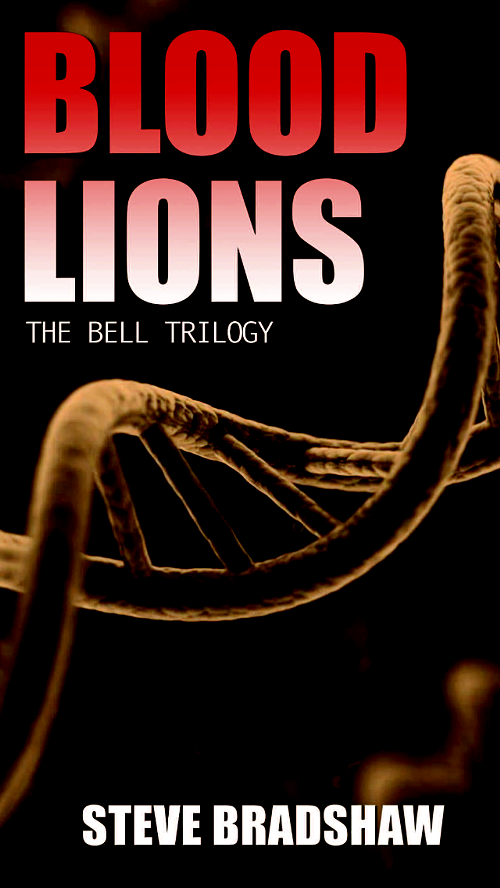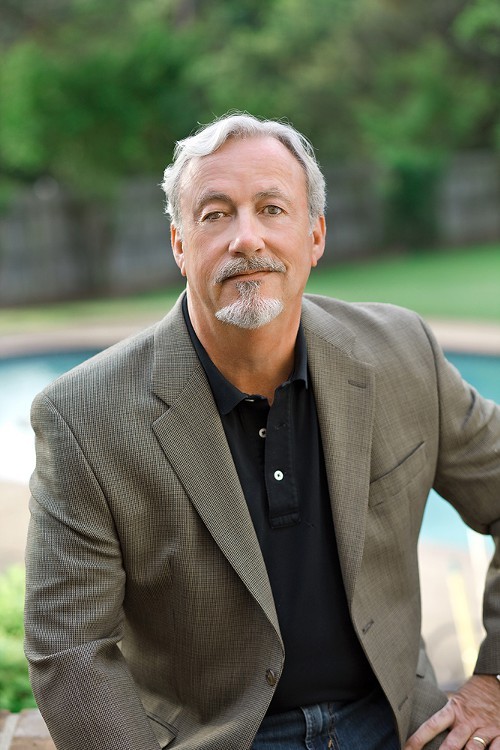It’s been more than a couple years since the publication of Bluff City Butcher, which is where readers first met the serial killer known by that name — a killer on the streets of Memphis known as much for his surgical skill with a knife as for his ability to survive all attempts on his own life. But that book wasn’t the end of the story.
In 2013, readers met the Butcher again in The Skies Roared. And late last year, there he was in Blood Lions (from Barringer, which has published all three books). Blood Lions put case closed to “The Bell Trilogy,” so-called by the author, Memphian Steve Bradshaw.
Or did it? Because in a recent Q&A, Bradshaw — by profession a forensics investigator turned biotechnology entrepreneur — left that question a little open.
[jump]

No question, however, that Bradshaw’s extended, multi-character suspense/thriller — set in Memphis and around the globe; gruesome, yes, but speculative too on the subject of genetic engineering — has its faithful followers. Just as Bradshaw’s extended, fictional Bell family has its major problems. Not the least of which: Gilgamesh, a hidden society of world billionaires anxious to get their hands on the formula for life everlasting — so anxious, in fact, that they’re willing to kill to get hold of it. But equally willing to see to it that they don’t get hold of it there’s the Bluff City Butcher.
What’s it like for a first-time author to start out big time at a thousand or so pages of complicated storytelling? And how, as the trilogy progressed, does the writing progress? A few things are for sure: In Blood Lions, there’s lesser emphasis on violence, more interest in the chase, more on motives, more on clearing up background family matters, until we reach, in the book’s closing pages, a key plot point that’s tied to Memphis history.
. . .
Steve Bradshaw: I wrote “The Bell Trilogy” with one mantra: Every page must grab and hold reader interest. Unlike the challenges of an average 85,000-word novel, my story and character-development arcs had to span 300,000 words, and each book had to have the strength to stand on its own merits. Each time, the reader’s expectations had to be met, and there had to be a reason to go to the next book in the trilogy. That was a daunting task.
But I knew where the trilogy would begin and where it would end. With support from my publisher, editors, and “alpha” readers, I grew. I turned to successful writers to learn more (Stephen King, Ken Follett, Dan Brown, Robert Ludlum, and John Grisham). And, of course, the act of writing “grows” an author. We soon learn that our characters take over. We are taken places we never planned. That was the greatest lesson learned as a new author.
Book I, Bluff City Butcher, is a dark story about a hideous serial killer. It sets the stage and tells the reader there is far more going on than you think. Book II, The Skies Roared, develops another beast, a sinister secret society on an even more horrific mission than the monster in Book I. And Book III, Blood Lions, is about a world-changing biologic and the collision of good and evil. The climax reveals a truth: the universality of the human struggle and our inner strengths.
Fair to say that this story could only have been set in Memphis? That the city acted not only as inspiration but as a character itself?
“The Bell Trilogy” had to be based in Memphis for reasons that become obvious in Book III. My intimate knowledge of the region allowed me to bring settings alive and provided the trilogy with a plethora of ideal venues for the capers to unfold: Beale Street, Mud Island, the Peabody hotel, the Mississippi River, the Hernando DeSoto Bridge, and more.

Now that the trilogy is complete, what are you working on? Is it Memphis-set, and are you already missing any of the characters you created in “The Bell Trilogy”? Your writing goals, in general, for the new year?
I’m writing a stand-alone suspense/thriller that draws upon my experience as a forensic investigator and biotechnology entrepreneur. In my next novel, advanced forensics, serial death, the paranormal, and clandestine government collide. The story begins in Henryetta, Oklahoma, and jumps to Memphis on a timeline three months after the last act of Blood Lions. My new story is an offshoot of “The Bell Trilogy,” with references to past events and key characters. Memphis homicide detective Tony Wilcox, a popular trilogy character, will have a role.
My 2015 writing goals are to release two stand-alone suspense/thriller novels and five short stories that will appear in horror, suspense, and mystery anthologies. And based on growing reader interest in “The Bell Trilogy” and its characters, I’m considering continuation of the series.
Regarding reader interest: What are you hearing from readers now that “Blood Lions” has been out for a while? And what about your readership outside of Memphis?
As a new author today, writing a novel is only half the challenge. Marketing that novel is the other half. I’m pleased with my steadily growing audience. Those who have been with me from the launch of Bluff City Butcher in 2012 have devoured Blood Lions. The most consistent feedback from readers is that they cannot put the books down.
I draw great personal satisfaction from those readers who have discovered me and find my brand of suspense/thrillers worthy of their time. Some have commented on my growth as a writer. Others are fascinated by the forensics and advanced biotechnology in my novels.
Most of my sales are ebooks (Amazon and B&N), and as expected, my primary audience is in the Mid-South. But it’s growing in other parts of the U.S. as awareness builds via social media, my website, radio talk show, book tours, and promotion. My 2015 objective is to expand the range of book-signings and promotion and to get an agent.
And you’ll continue to speak before writing groups on the suspense/thriller genre?
I’m building my travel plans with attention on visiting book clubs and organizations and participating in writing groups like Malice in Memphis, State of Horror, and CCWriters. I’ll increase book tours outside the Mid-South with an emphasis on independent bookstores. I’ll be involved with Southern Writers Magazine, writing a bimonthly column to help mystery/thriller authors with modern-day forensics and writing crime fiction for a savvier world. And I’ll increase my attendance at writers’ conferences (Killer Nashville, for example), at comicons, and at book festivals.
When I started writing “The Bell Trilogy,” I felt I knew my strengths and weaknesses. As a successful businessman, I’d learned to recognize and leverage assets and to seek help from experts to grow.
But launching my writing career with a trilogy was like catching an 80-foot wave the first time I surfed. What began as an awesome idea soon turned into a death-defying act. My determination helped me find what I needed each time the wave blocked the sun. •
Follow Steve Bradshaw on his website, through his radio talk show, on Facebook, Twitter, and LinkedIn.